If you’re looking for the best hay for your beef cattle, there are a few factors to consider before making your purchase. Quality hay is essential for maintaining the health and wellbeing of your cattle, so it's important to choose the right type of hay for their specific dietary needs.
Firstly, you should consider the age and nutritional requirements of your cattle. Older or thinner cows may need a higher quality hay with more protein and energy, whereas younger cattle may require more fiber in their diet. Check the hay’s nutritional value and ensure it meets the needs of your livestock.
Secondly, you should also consider the type of hay you are buying. Alfalfa hay is a popular option for cattle due to its high protein content, while grass hay is a more affordable option that provides good roughage. Both types of hay have their own advantages and disadvantages, and it's important to choose the type that best suits your needs and budget.
Are you unsure about which type of hay is best for your cattle? Consider some of these questions: How much should I be feeding my cattle? Is it more cost-effective to buy hay in large quantities or smaller bales? How often should I be checking my hay quality? Answering these questions can make the process of finding the best hay for your livestock much easier.
10 Best Hay For Beef Cattle
| # | Product Image | Product Name | Product Notes | Check Price |
|---|---|---|---|---|
|
1
|
This product is ideal for rabbits, guinea pigs, chinchillas, and other small animals as a premium natural hay.
|
|
||
|
2
|
The product is ideal for feeding small animals such as rabbits, guinea pigs, and chinchillas.
|
|
||
|
3
|
This product is ideal for small herbivorous pets like rabbits, guinea pigs, chinchillas, hamsters, and gerbils as a natural hay feed option.
|
|
||
|
4
|
The product is ideal for feeding animals such as horses, cows, and sheep as part of their diet.
|
|
||
|
5
|
Ideal for small herbivorous pets such as rabbits, guinea pigs, chinchillas, hamsters, and gerbils as a natural hay food source.
|
|
||
|
6
|
The product is ideal for feeding small herbivores, such as rabbits, guinea pigs, and chinchillas.
|
|
||
|
7
|
It is ideal for pet guinea pigs, rabbits and other small animals as a source of Timothy Hay and carrots.
|
|
||
|
8
|
It's ideal for providing a variety of high-quality hay options for small pets.
|
|
||
|
9
|
It is ideal for small animals such as rabbits, guinea pigs, chinchillas, hamsters, and gerbils to consume as hay.
|
|
||
|
10
|
It is an ideal food source for small animals such as guinea pigs, rabbits, and chinchillas.
|
|
1. Timothy Hay Perfect Blend: Premium Small Pet Food
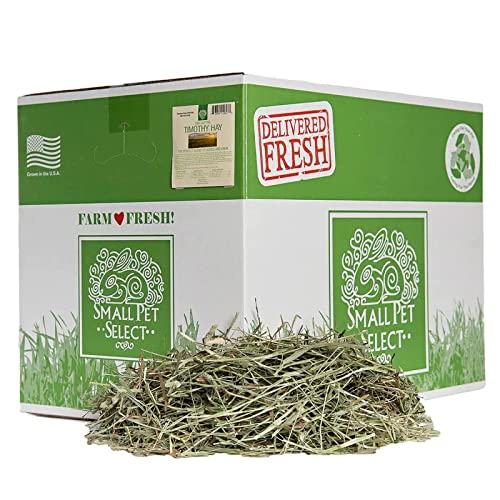
The Hand-Selected Timothy Hay is a top-quality product that guarantees a healthy and happy life for your small furry friends. The team carefully selects and hand-packs each box in small batches to ensure that only the highest quality 100% US-grown 2nd cut Timothy hay is delivered to your doorstep. The 2nd cut Timothy hay is a perfect balance of stem, seed head, and leaf, which provides the rough fiber necessary for normal wear and healthy teeth. Additionally, the fresh smell of the hay ensures that your pets will keep coming back for more.
The product is packaged in an earth-friendly way that ensures the safety of your small animal companions. The hay is not compressed, which prevents stem and leaf integrity damage. Each package is shipped in a high-strength corrugated box that is easy to store and fun for your pets to dig through.
The Timothy hay is minimally handled and delivered fresh to make it easy for you to provide exactly what your little friend needs. The hay is an excellent source of protein, fiber, and fat, which keeps your small pet healthy. Regular shipments of fresh hay from the farm ensure that your pets' growing teeth are worn down, and their digestive health is protected. You may not receive thanks with words from your small pet, but their happy oinks and binkies will make you feel like the pet owner of the year.
In addition to being a crucial part of many small pet diets, Timothy hay also makes cozy bedding for hamsters, gerbils, mice, rats, ferrets, and more. The hay makes a fresh-smelling alternative to tiny duvets that your pets will love to snuggle into.
The Hand-Selected Timothy Hay comes with a 100% Satisfaction Guarantee for you and your pets. The team understands that pets can be picky, and if your bunny, piggy, or chinny stomps and turns up her nose, you can still rest easy.
2. American Pet Diner 140 Timothy Gold Hay, 24 Oz,blue
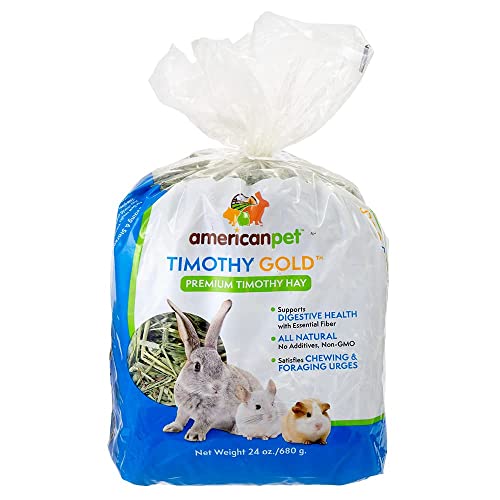
Looking for a natural and healthy way to support your digestive system and dental health? Look no further than this product!
Packed with essential fiber, this product provides the perfect balance of sweetness and nutrition to keep your body functioning at its best. With its natural ingredients, it's a great choice for anyone looking to improve their overall health and wellbeing.
In addition to supporting your digestive health, this product also helps promote necessary dental wear. By providing the right amount of fiber and nutrients, it helps keep your teeth and gums healthy and strong.
So if you're looking for a tasty and nutritious way to improve your health, give this product a try! With its pure, sweet, and natural ingredients, you can feel good about what you're putting into your body. Plus, with its ability to support both your digestive system and dental health, it's a great choice for anyone looking to improve their overall wellbeing.
3. Timothy Hay Stacks – All-Natural Small Pet Food
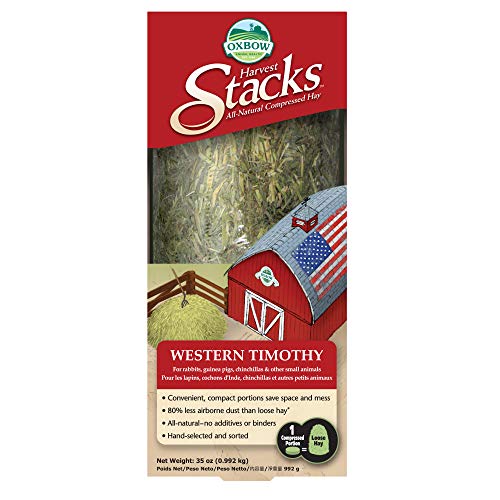
Experience the premium quality of Oxbow’s 100% all-natural hay, proudly grown in the USA by expert hay growers. Oxbow hay growers undergo extensive training in the production of premium hay, ensuring that each strand is hand-selected and hand-sorted for optimal nutrition and quality.
Say goodbye to additives and binders with Oxbow’s all-natural hay. This high-quality hay is free from any artificial ingredients, allowing your furry friend to enjoy a completely natural and healthy meal.
Reduce airborne dust during mealtime with Oxbow’s Harvest Stacks. Our compressed hay stacks produce up to 80% less dust than loose hay, ensuring a clean and comfortable environment for your pet.
Encourage interaction and stimulation between your pet and their food with Oxbow’s Harvest Stacks. These stacks provide added mental and physical stimulation during mealtime, allowing your furry friend to play with their food while enjoying a nutritious meal.
Oxbow’s Harvest Stacks are used and recommended by leading veterinarians worldwide. Trust in the quality and expertise of Oxbow for your pet’s nutritional needs.
4. Standlee Hay Company 1375-30101-0-0 Orch Grass Pellet, 40 Lb
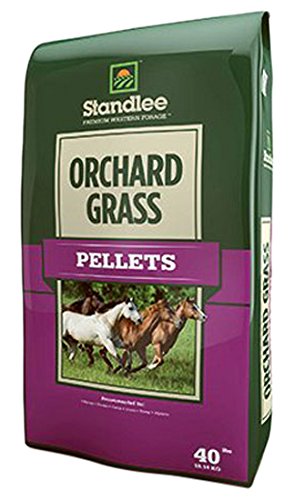
Looking for a high-quality forage for your farm or stable animals? Look no further than these premium orchard grass pellets. These pellets are perfect for providing your animals with the nutrition they need to stay healthy and happy.
Crafted from only the finest orchard grass, these pellets are packed with essential vitamins and minerals that will keep your animals in tip-top shape. They are also easy to handle and use, making them a great choice for busy farmers and stable owners.
Whether you are looking to feed your horses, cows, or other farm animals, these orchard grass pellets are the perfect choice. They are made from top-quality ingredients and are carefully crafted to ensure maximum nutrition and flavor.
So why wait? If you are ready to take your farm or stable to the next level, order your premium orchard grass pellets today and start seeing the results for yourself!
5. Natural 25 Lb. Hay For Small Animals
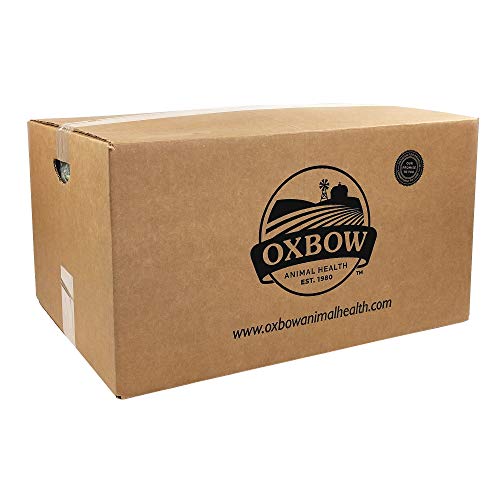
This premium hay is proudly grown in the USA, hand-sorted, and hand-packed with care by Oxbow's team of expert hay growers. The hay is 100% all-natural with no additives or binders, ensuring that it meets specific nutritional requirements for small pets. Oxbow's hay growers are trained to produce premium hay, making it high in fiber, which promotes a healthy digestive system and dental health. Fiber is essential for the health of your rabbit, guinea pig, chinchilla, or other small pet.
The hay comes in three bulk sizes – 9 lb, 25 lb, and 50 lb, which provide an incredible value and are perfect for pet parents with multiple pets. Oxbow's Western Timothy hay is highly recommended by leading veterinarians worldwide, making it a trusted choice for your pet's nutrition.
Suitable for pets of all life stages, this hay is an all-natural and healthy option for your small pets. Oxbow's commitment to producing premium hay ensures that your pets receive the best possible nutrition.
6. Oxbow Animal Health Oxbow Hay Blends – Western Timothy & Orchard – 90 Oz.
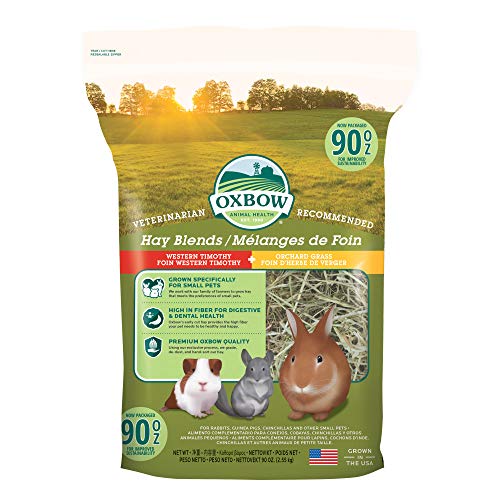
The Oxbow family of farms in the USA takes pride in providing premium quality hay for small pets. Their hay growers are experts in their field and carefully harvest the hay to ensure the best quality. Each bundle is hand-sorted and hand-packed to ensure that the hay is fresh and in top-notch condition.
Oxbow's hay is 100% all-natural with no additives or binders added. This means that small pets can enjoy a healthy and natural diet without any harmful chemicals or substances. The hay blend includes two popular varieties, Western Timothy and Orchard Grass, to provide an enriching variety for small pets to enjoy.
Leading veterinarians worldwide have used and recommended Oxbow's hay for small pets. The all-natural hay is perfect for picky eaters, as it provides variety and encourages healthy eating habits.
7. Kaytee Timothy Hay Plus Carrots For Pet Guinea Pigs, Rabbits & Other Small Animals, 24 Oz
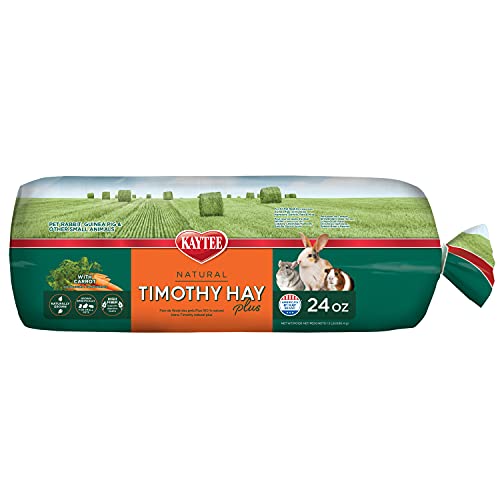
This premium product offers small animals a delicious and nutritious treat that will keep them happy and healthy. Made with long-strand, all-natural timothy hay, this product has been carefully selected for its high fiber content and ability to support digestive health.
To enhance the flavor and texture, this product contains a mix of spearmint, marigold, and carrot. These ingredients have been chosen to provide a variety of tastes and textures that your pet will love.
This hay is grown specifically for small animals, ensuring that it is of the highest quality and meets their unique nutritional needs. With all-natural, non-GMO ingredients, you can be confident that you are providing your pet with a safe and healthy treat.
As America's #1 Hay Brand, you can trust that this product has been thoroughly tested and meets the highest standards of quality. Whether you have a rabbit, guinea pig, or other small animal, they will love this delicious and nutritious treat.
8. Small Pet Select-Sampler Box, 2nd Cutting, 3rd Cutting Timothy Hay, Oat Hay, & Orchard Hay
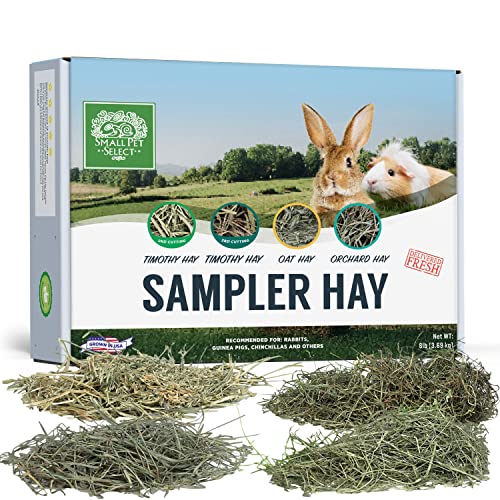
This hay bundle is specially curated for small animal owners who are looking to offer the best quality and variety to their furry friends. The bundle includes our top 4 best selling hay which are 2nd Cutting, 3rd Cutting, Orchard, and Oat. This is an excellent solution for pet owners who want to test out which hay suits their little animal's taste or to add variety to their diet.
At this company, they are passionate about pets, just like you are. That's why they hand-select and package the hay in small batches, ensuring that your pet gets the best quality hay. The hay is delivered fresh and minimally handled, directly to your doorstep in a high-strength corrugated box that opens and closes for easy storage.
The company prides itself on providing the highest quality premium hay for rabbits, guinea pigs, and chinchillas. You can be confident that your pet is getting the best nutrition possible with this bundle. The hay is carefully selected and packed to ensure that it is fresh and of the highest quality.
9. Natural Nourishment: Oxbow Timothy Hay
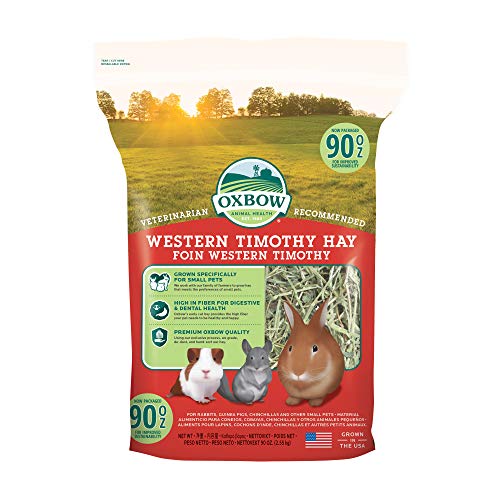
Oxbow takes pride in their family of farms located in the USA, where their expert hay growers carefully harvest fresh hay. They prioritize premium quality, with their hay growers trained to sort and pack the hay by hand with great care. The hay is 100% all-natural, without any additives or binders.
This hay meets the specific nutritional requirements of small pets, making it an ideal choice for rabbits, guinea pigs, chinchillas, and other small pets. It is high in fiber, which contributes to a healthy digestive system and dental health. Fiber is essential for the overall health of small pets.
Leading veterinarians worldwide recommend Oxbow hay for small pets, adding to its credibility and reliability. To feed your pet, simply place large handfuls of grass hay in their habitat every day. You can mix different grass hays together to provide your pet with a diverse diet. Additionally, trying out different tastes and textures can help you determine your pet's favorites.
10. Vitakraft Small Animal Timothy Hay For Guinea Pigs, Rabbits, And Chinchillas – 3.5 Lbs
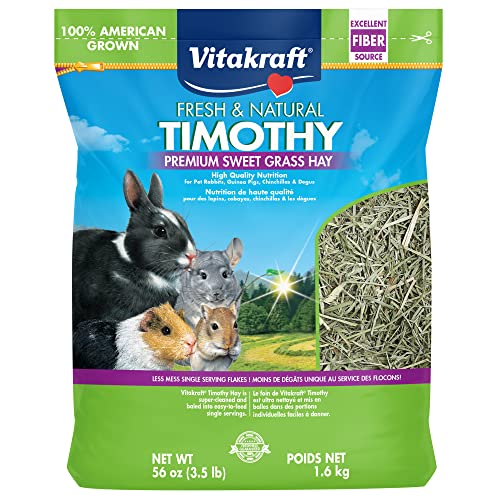
This all-natural hay is the perfect addition to your furry friend's daily diet. Made from 100% sun-cured, farm grown timothy hay, it contains no artificial colors, preservatives, or pesticides.
Carefully harvested by hand at peak maturity, this hay ensures the best nutrient content and stem quality. It is then packaged and tightly compressed with bands to protect it from UV light, keeping it greener and more flavorful for longer periods of time.
The mini hay bales are portioned into individual slices, making feeding easier and less messy.
This high-fiber hay is lower in protein and calcium than alfalfa hay, making it the perfect basis for your adult rabbit, guinea pig, or chinchilla's daily diet. The long strand fibers also help wear down always-growing teeth, supporting long-term dental health.
Best Hay For Beef Cattle FAQs
Are there any hay additives or supplements that can enhance the nutritional value of hay for beef cattle?
Yes, there are several hay additives and supplements that can enhance the nutritional value of hay for beef cattle. Some of the common additives include molasses, protein supplements, minerals, and vitamins.
Molasses is a good source of energy and can improve the palatability of hay. It can also help to reduce dust and improve the overall quality of hay. Protein supplements such as soybean meal, cottonseed meal, and distillers' grains can help to increase the protein content of hay, which is important for beef cattle growth and development.
Minerals such as calcium, phosphorus, and magnesium are essential for proper bone development, muscle function, and overall health of beef cattle. These minerals can be added to hay as supplements to ensure that the cattle receive adequate amounts.
Vitamins such as vitamin A, D, and E are important for immune function, growth, and reproduction. Adding vitamin supplements to hay can help to ensure that the cattle receive sufficient amounts of these essential vitamins.
Overall, hay additives and supplements can be a cost-effective way to enhance the nutritional value of hay for beef cattle and promote overall herd health and productivity.
Can I feed my beef cattle hay that has been cut and baled during different times of the year?
Yes, you can feed your beef cattle hay that has been cut and baled during different times of the year. However, it is important to keep in mind that the nutritional content of the hay will vary depending on the time of year it was harvested.
Hay that is harvested in the early spring or late fall tends to be higher in protein and energy, while hay that is harvested in the summer may be lower in these nutrients. This is because the stage of growth of the plants at the time of harvest can affect the nutrient content.
It is important to have your hay tested for nutrient content before feeding it to your cattle, so you can adjust their diet accordingly. Additionally, it is recommended to provide your cattle with a balanced diet that includes a variety of feed sources, such as hay, pasture, and possibly grain or other supplements.
Overall, feeding your cattle hay from different times of the year can be a cost-effective way to provide them with the roughage they need, as long as you take into account the variations in nutrient content and supplement their diet accordingly.
How do I determine the quality of hay for my beef cattle?
The quality of hay for beef cattle can be determined by several factors such as color, texture, aroma, and nutrient content. Color is an important factor as it shows the maturity of the plant. Green hay is usually of better quality than yellow or brown hay. The texture should be soft and pliable but not too brittle. Aroma is also important, as fresh hay should have a sweet and pleasant smell, while moldy or musty hay should be avoided.
Nutrient content is the most important factor in determining hay quality. The protein, fiber, and energy content can be measured by sending a sample to a laboratory for analysis. This will help determine if the hay meets the nutritional needs of beef cattle. High-quality hay should contain at least 7-10% protein, 30-35% fiber, and 50-60% total digestible nutrients (TDN).
It is also important to consider the type of hay, as different types have different nutrient contents. Alfalfa hay is high in protein and calcium, while grass hay is lower in protein but higher in fiber. A balanced diet for beef cattle should consist of a combination of hay, grains, and supplements.
Regularly testing hay quality and providing a balanced diet can help ensure healthy and productive beef cattle.
How much hay should I feed my beef cattle?
The amount of hay to feed your beef cattle depends on several factors, such as the weight, age, and activity level of the animals, as well as the quality of the hay. As a general rule of thumb, adult beef cattle should consume about 2 to 2.5% of their body weight in hay per day. For example, a 1,000-pound cow would need about 20 to 25 pounds of hay daily.
However, it's important to monitor your cattle's body condition score (BCS) regularly to ensure they are not over or underfed. A BCS of 5-6 is considered healthy for most beef cattle breeds. If your cattle are losing weight or have a low BCS, consider increasing their hay intake or supplementing with grain or protein-rich feeds. Conversely, if your cattle are overweight or have a high BCS, consider reducing their hay intake and providing more exercise opportunities.
Remember to provide clean, fresh water at all times and offer hay in a feeder or rack to minimize waste and contamination. Consult with your veterinarian or a livestock nutritionist to develop a feeding plan that meets the specific needs of your beef cattle.
Should I feed my beef cattle hay with or without legumes?
The answer to this question depends on a number of factors, including the age of your cattle, the stage of production they are in, and the nutritional needs of the animals. In general, hay that includes legumes such as alfalfa or clover can provide a higher level of protein and other nutrients than hay made solely from grasses. This can be beneficial for growing and lactating cattle, as well as for those in late gestation. However, too much protein can be harmful to mature, non-breeding cattle, as it can lead to issues such as urinary calculi. If you are unsure whether your cattle need hay with legumes or not, it is best to consult with a veterinarian or an experienced beef cattle nutritionist to develop a feeding program that meets the specific needs of your animals.
What are the benefits of feeding my beef cattle hay with a higher protein content?
Feeding beef cattle hay with a higher protein content can bring a number of benefits. Firstly, a higher protein content can support the growth and development of the cattle, particularly in young or growing animals. This is because protein is essential for the formation of muscle, bone and other tissues. Additionally, a higher protein content can promote improved feed conversion rates, meaning that more of the feed is converted into usable energy for the animal. This can lead to improved weight gain and overall health.
Another benefit of feeding hay with a higher protein content is that it can help to maintain the overall health of the animal. Protein is critical for the proper functioning of the immune system, and can help to support the animal's ability to fight off disease and infection. Additionally, a higher protein content can help to improve the quality of the animal's coat or fur, which can be particularly important for those raised for show or for meat production.
Overall, while there may be additional costs associated with feeding hay with a higher protein content, the benefits to the health and wellbeing of the animal can make it a worthwhile investment for beef cattle farmers.
What are the differences between grass hay and alfalfa hay for beef cattle?
Grass hay and alfalfa hay are two common types of forage fed to beef cattle. Grass hay is made from a variety of grasses, such as timothy, brome, and orchardgrass, while alfalfa hay is made from the legume plant alfalfa.
One of the main differences between grass hay and alfalfa hay is their nutrient content. Alfalfa hay is higher in protein, minerals, and vitamins than grass hay, making it a good option for growing or lactating beef cattle. Grass hay, on the other hand, is lower in protein but higher in fiber, which can be beneficial for maintaining the digestive health of beef cattle.
Another difference is the digestibility of the two types of hay. Alfalfa hay is more easily digestible than grass hay, meaning that beef cattle can extract more nutrients from it. While grass hay has a lower digestibility, it can still provide adequate nutrition if supplemented with protein and minerals.
Overall, the choice between grass hay and alfalfa hay for beef cattle will depend on the specific nutritional needs of the animal and the availability and cost of each type of hay. It is important to work with a veterinarian or nutritionist to determine the best feeding strategy for your beef cattle.
What are the nutritional requirements for beef cattle when it comes to hay?
When it comes to hay, beef cattle require certain nutritional requirements to maintain a healthy diet. The type of hay that a cattle farmer chooses will impact the nutritional value that the beef cattle receive. Generally, hay should have a minimum of 7% crude protein and a maximum of 50% total digestible nutrients (TDN). The crude protein helps with the growth and maintenance of muscle, while the TDN is necessary for energy and maintaining body weight.
In addition to crude protein and TDN, beef cattle also require a sufficient amount of vitamins and minerals. Hay should contain adequate amounts of calcium, phosphorus, magnesium, potassium, and sulfur. Vitamins A, D, E, and K are also important for the overall health of the cattle.
It is important for cattle farmers to regularly test their hay to ensure that it meets the nutritional requirements for their herd. If the hay is lacking in any essential nutrients, supplements may need to be added to the cattle's diet to ensure they are receiving a balanced diet.
What is the best type of hay for beef cattle?
When it comes to feeding beef cattle, hay is an essential part of their diet. It is a great source of forage that provides the necessary nutrients for the animal's growth and development. The best type of hay for beef cattle varies depending on several factors such as the stage of growth of the cattle, the climate, and the availability of hay in the region.
Typically, the most suitable type of hay for beef cattle is grass hay, specifically timothy, brome, or orchard grass. These types of hay are high in fiber, protein, and energy, which are essential for the cattle's digestion and overall health. Alfalfa hay is also a great option for beef cattle, but it should be given in moderation as it is higher in protein and calcium.
It is important to note that the quality of hay is just as crucial as the type. Good quality hay should be clean, free from mold, and have a fresh smell. Cattle should have access to clean water at all times while consuming hay. A balanced diet that includes hay, grains, and minerals is essential for the optimal growth and health of beef cattle.
What is the best way to store hay for beef cattle to maintain its nutritional value?
The best way to store hay for beef cattle to maintain its nutritional value is to minimize exposure to moisture, sunlight, and air. These elements can degrade the hay's quality and lead to mold growth, which can be harmful to the cattle.
One effective technique is to store the hay in a dry, well-ventilated barn or shed. This will protect it from the elements and prevent moisture from accumulating. Additionally, it's important to stack the hay properly to allow for airflow and prevent compression, which can also lead to mold growth.
Another alternative is to use plastic wrap or tarps to cover the hay bales. This can protect them from moisture and sunlight while still allowing for ventilation. However, it's important to make sure the bales are dry before wrapping them, as any moisture trapped inside can lead to mold growth.
Regular inspection of the stored hay is also crucial to ensure its quality. Any signs of mold or spoilage should be addressed immediately, and the affected hay should be removed or treated. By following these practices, beef cattle farmers can ensure that their hay maintains its nutritional value and provides a healthy diet for their animals.
